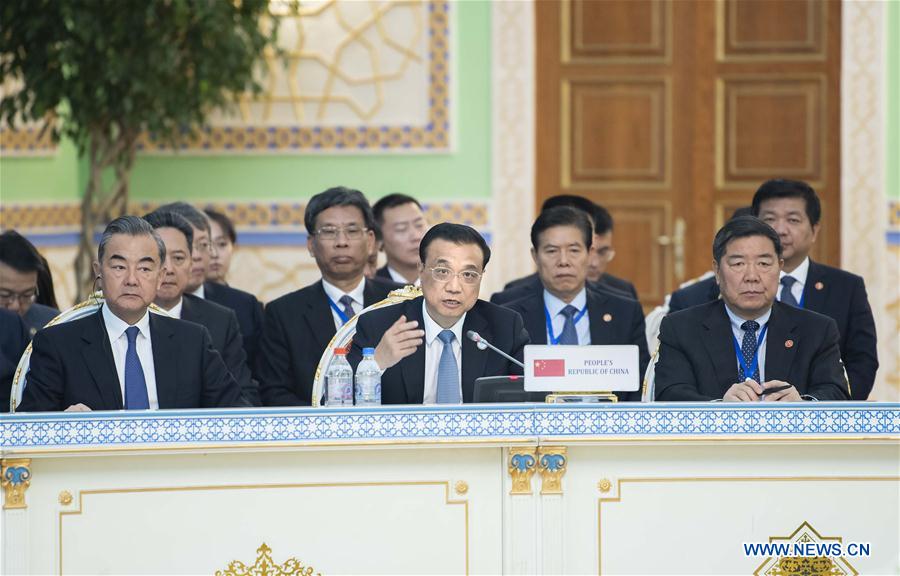


Chinese Premier Li Keqiang (C, front) attends the 17th meeting of the Shanghai Cooperation Organization (SCO) Council of Heads of Government in Dushanbe, Tajikistan, on Oct. 12, 2018. (Xinhua/Li Tao)
Chinese Premier Li Keqiang on Friday urged Shanghai Cooperation Organization (SCO) member countries to further promote win-win cooperation in various fields and achieve common development.
Addressing the 17th meeting of the SCO Council of Heads of Government in the Tajik capital of Dushanbe, he highlighted, among others, the areas of multilateral economic cooperation and trade, production capacity cooperation, and connectivity.
He noted that at the landmark SCO summit held earlier this year in the Chinese city of Qingdao, Chinese President Xi Jinping and other SCO leaders reached important consensus and injected strong impetus to the SCO's future development.
In order to build on the sound momentum, Li proposed advancing SCO cooperation in six areas: security, multilateral economic cooperation and trade, production capacity cooperation, connectivity, innovation, and people-to-people ties.
The SCO serves as an important platform for Belt and Road Initiative (BRI) cooperation, Li said, adding that China is ready to further synergize the BRI with development strategies of fellow SCO members to make the SCO an example of openness, cooperation and common development.
FREE TRADE
Noting the setbacks in economic globalization and backlash against the multilateral trading regime, Li said the SCO member countries are faced with new challenges in economic development.
"Past experience shows that development cannot be achieved behind closed doors, and opening up is the right way forward," Li said.
He called on the SCO member countries to firmly support free trade and the rules-based multilateral trading regime and further advance trade and investment liberalization and facilitation.
SCO members, Li added, also need to take solid steps to promote multilateral trade and economic cooperation, launch feasibility studies on establishing an SCO free trade area, and develop institutional arrangements for closer regional economic cooperation.
Zooming in on agriculture, Li said China hopes to expand imports of high-quality agricultural products from fellow SCO member countries and also hopes that more specialty Chinese agricultural products will be made available for customers in other SCO countries.
PRODUCTION CAPACITY
On production capacity cooperation, Li said China has joined hands with other SCO member countries to set up seven overseas national-level economic and trade cooperation zones, which have started to boost growth and create jobs for local communities.
The stock of Chinese investment in SCO member states has now reached 84.6 billion U.S. dollars, much of which has been channeled to projects in this area, he added.
The premier said that China will continue to encourage competent Chinese enterprises to invest in other SCO member countries and expand cooperation in infrastructure, processing, manufacturing, energy exploitation and agriculture.
SCO members also need to make the best use of financing platforms such as the Asian Infrastructure Investment Bank, the Silk Road Fund, the SCO Interbank Consortium and the China-Eurasia Economic Cooperation Fund, Li said, while calling for continued discussions at the expert level to explore a feasible plan for setting up an SCO development bank.
CONNECTIVITY
The Chinese premier also stressed that interconnectivity among the SCO member countries is not only a necessary requirement of regional development but also a focus of BRI cooperation.
"Convenient and efficient transportation networks are critical to the free flow of production factors, cross-border trade and travels," he said.
He noted that recent years have seen notable headway in SCO connectivity building: better railway infrastructure along the routes of the China-Europe freight train service, more sophisticated intra-region cross-border road networks, and a number of oil and gas pipelines.
Li called for more efforts to enhance cooperation among railway administrations in SCO countries, improve the harmonization of policies, technologies and standards, and expand the cross-border railway networks in the region.
"Efforts should also be made to set up multimodal logistics centers and equip them with up-to-date technologies to automate and simplify border, customs and sanitary procedures for goods clearance in order to create an enabling soft environment," Li said.
Talking about China's economic policies, Li said China will keep to the course of reform and opening-up and roll out reform measures in all respects to maintain China's position as a magnet for foreign investment.
Prime ministers and representatives attending Friday's meeting said that under the new circumstances countries in the region particularly need to strengthen solidarity, maintain stability, advance trade and investment liberalization and facilitation, and safeguard multilateralism and free trade.
They agreed to implement the outcomes of the Qingdao summit, cement cooperation in trade, investment, energy, agriculture and people-to-people exchanges, and jointly fight against terrorism and extremist forces.
The leaders issued a joint communique and ratified several resolutions and cooperation documents involving trade, technology and environmental protection.

 Award-winning photos show poverty reduction achievements in NE China's Jilin province
Award-winning photos show poverty reduction achievements in NE China's Jilin province People dance to greet advent of New Year in Ameiqituo Town, Guizhou
People dance to greet advent of New Year in Ameiqituo Town, Guizhou Fire brigade in Shanghai holds group wedding
Fire brigade in Shanghai holds group wedding Tourists enjoy ice sculptures in Datan Town, north China
Tourists enjoy ice sculptures in Datan Town, north China Sunset scenery of Dayan Pagoda in Xi'an
Sunset scenery of Dayan Pagoda in Xi'an Tourists have fun at scenic spot in Nanlong Town, NW China
Tourists have fun at scenic spot in Nanlong Town, NW China Harbin attracts tourists by making best use of ice in winter
Harbin attracts tourists by making best use of ice in winter In pics: FIS Alpine Ski Women's World Cup Slalom
In pics: FIS Alpine Ski Women's World Cup Slalom Black-necked cranes rest at reservoir in Lhunzhub County, Lhasa
Black-necked cranes rest at reservoir in Lhunzhub County, Lhasa China's FAST telescope will be available to foreign scientists in April
China's FAST telescope will be available to foreign scientists in April